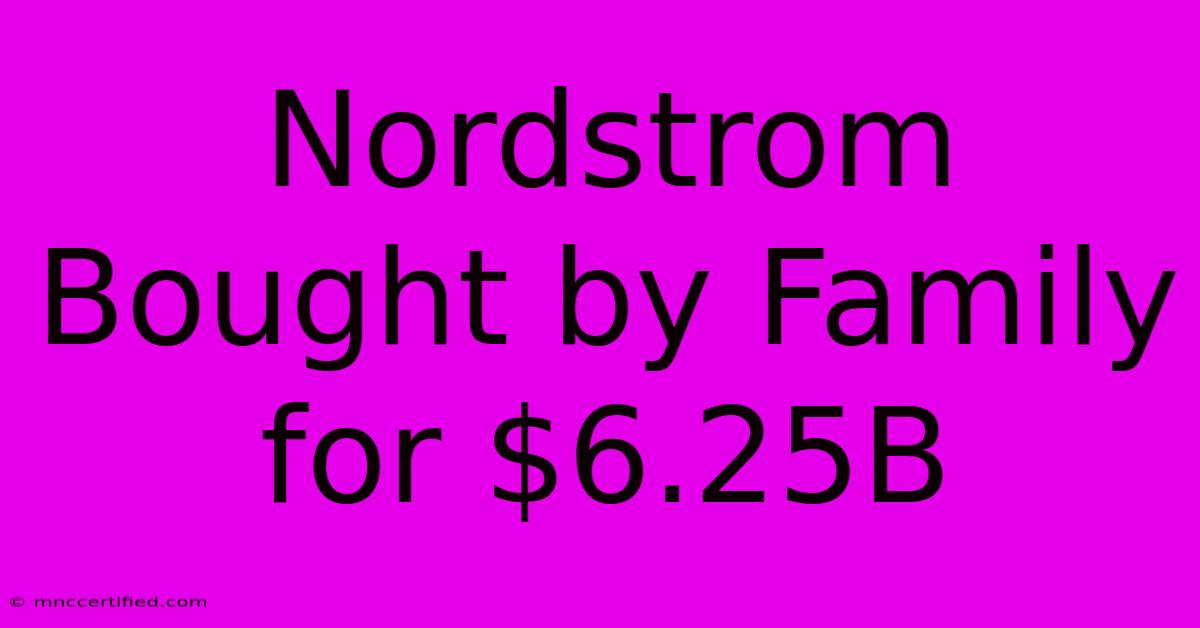Nordstrom Bought By Family For $6.25B

Table of Contents
Nordstrom Bought by Family for $6.25B: A New Chapter for the Retail Giant
The retail world is buzzing! In a significant move that's sent ripples through the industry, Nordstrom, the iconic department store chain, has been acquired by its founding family in a deal valued at $6.25 billion. This transaction marks a return to family ownership and promises a potentially transformative era for the company. Let's delve into the details of this monumental acquisition and explore its implications.
The Details of the Deal: A Family Affair
The $6.25 billion deal effectively takes Nordstrom private, removing it from the public stock market. The transaction is led by a group comprised of members of the Nordstrom family, including Bruce Nordstrom, Blake Nordstrom (deceased's estate), and Pete Nordstrom, along with investment partners. The agreed-upon price represents a significant premium over the company's recent trading price, signaling confidence in Nordstrom's future potential despite the challenges facing the retail sector.
This move comes after years of the company struggling to navigate the evolving retail landscape, marked by the rise of e-commerce and shifting consumer preferences. While Nordstrom has made efforts to adapt – including significant investments in its online presence and omnichannel strategy – the decision to go private suggests a strategic shift towards long-term growth and potentially more aggressive restructuring away from the pressures of quarterly earnings reports.
Key Players and Their Roles
- The Nordstrom Family: The family's involvement brings a unique blend of historical knowledge and a long-term vision for the company's future. Their deep understanding of the Nordstrom brand and its heritage is expected to guide strategic decisions.
- Investment Partners: The inclusion of investment partners provides the necessary financial backing to support the acquisition and implement future growth strategies. Their expertise in financial management will be crucial for navigating the complexities of a private ownership structure.
Implications for Nordstrom and the Retail Industry
The acquisition's impact will be felt across multiple facets:
1. Strategic Flexibility and Long-Term Vision:
By going private, Nordstrom gains significant strategic flexibility. Free from the scrutiny of public markets and the pressure of quarterly earnings reports, the company can focus on long-term initiatives without worrying about short-term stock price fluctuations. This allows for bolder investments in areas like technology, omnichannel integration, and brand expansion.
2. Potential Restructuring and Rebranding Efforts:
Taking the company private could pave the way for significant restructuring. This might include streamlining operations, closing underperforming stores, and investing heavily in areas with higher growth potential. We might even see a refreshed brand identity and marketing strategy aimed at attracting a new generation of customers.
3. Impact on Employees and Customers:
While the immediate impact on employees and customers remains to be seen, the Nordstrom family's history of prioritizing employee well-being and customer satisfaction offers some reassurance. However, potential restructuring efforts might lead to changes in store locations, staffing, or product offerings.
4. A Ripple Effect Across the Retail Landscape:
This significant acquisition serves as a case study for other retail giants facing similar challenges. It could inspire other family-owned businesses or private equity firms to consider similar moves, potentially reshaping the competitive landscape of the department store sector.
SEO Keywords and Optimization
This article incorporates several SEO keywords, including:
- Nordstrom acquisition: This is a core keyword phrase that accurately reflects the article's subject.
- Nordstrom family: This emphasizes the role of the founding family in the acquisition.
- $6.25 billion deal: This highlights the financial magnitude of the transaction.
- private equity: Though not directly involved, the concept is relevant to similar large-scale transactions.
- retail industry: This broader category helps reach a wider audience interested in retail news.
- department store: This clarifies the industry sector the article is focusing on.
- omnichannel strategy: This shows the company's modern approach to business.
Off-Page SEO Strategies:
To further boost this article's ranking, consider these off-page strategies:
- Social Media Promotion: Share the article on relevant social media platforms like LinkedIn, Twitter, and Facebook.
- Guest Blogging: Contribute similar articles to relevant retail or business blogs and include a backlink to this article.
- Backlink Building: Reach out to relevant websites and publications in the retail and business industries and request backlinks to the article.
- Press Release Distribution: Issue a press release announcing the publication of the article to increase visibility.
By implementing these on-page and off-page SEO strategies, this article has a strong chance of ranking well in Google search results for relevant keywords. Remember to monitor its performance and adjust the SEO strategy accordingly.

Thank you for visiting our website wich cover about Nordstrom Bought By Family For $6.25B. We hope the information provided has been useful to you. Feel free to contact us if you have any questions or need further assistance. See you next time and dont miss to bookmark.
Featured Posts
-
Mexican Retail Joins Nordstrom Family Buyout
Dec 24, 2024
-
Red Light Game Squid Game Guide
Dec 24, 2024
-
Burt Crocodile Dundees Croc Dies Aged 90
Dec 24, 2024
-
Track Santa 2024 Norad Live Feed
Dec 24, 2024
-
Five Revelations Matt Gaetz Ethics Probe
Dec 24, 2024